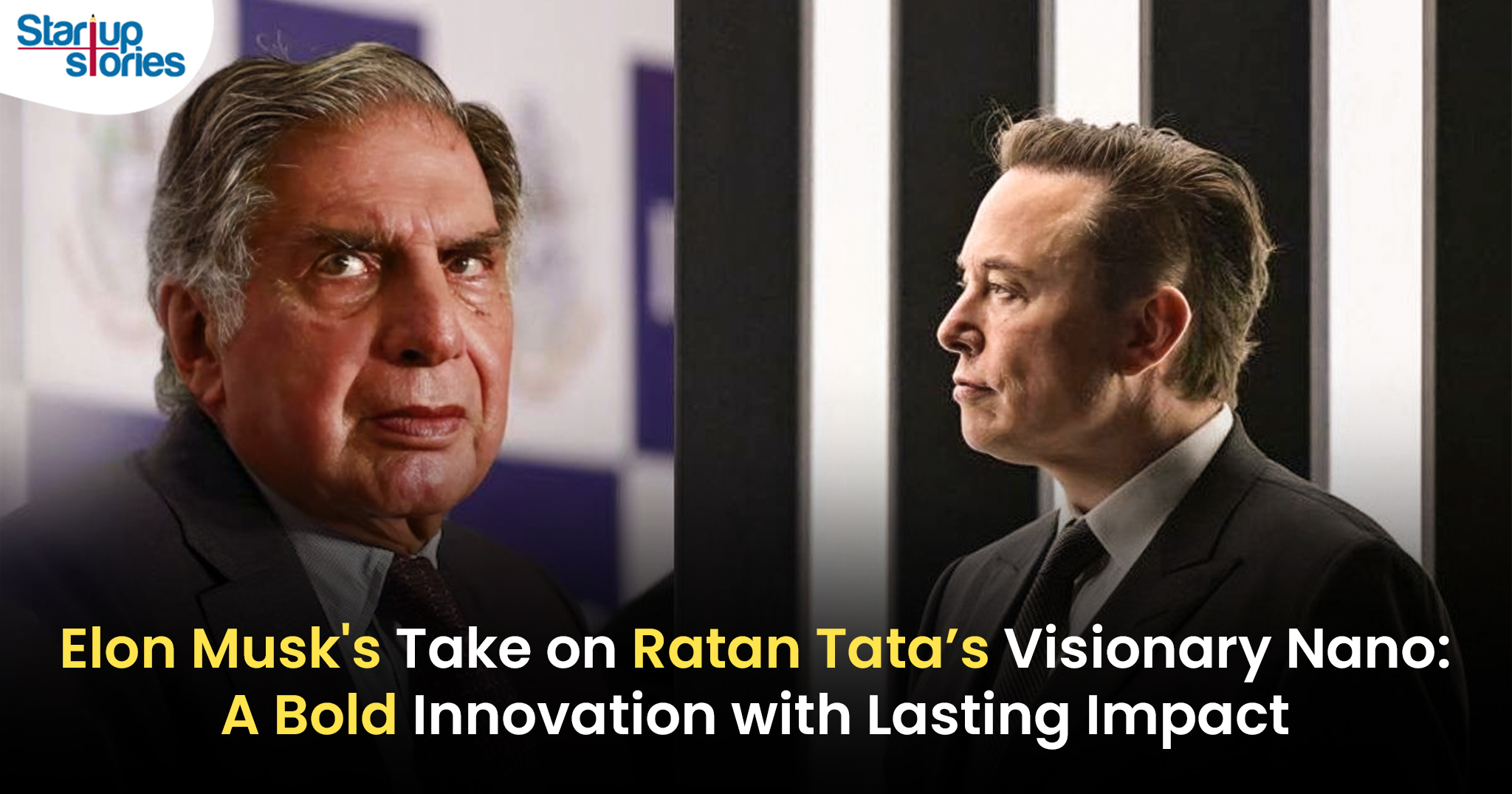News
“Elon Musk Praised Ratan Tata’s Ambitious Nano Project” what do you think?

In a resurfaced 2009 interview, Tesla CEO Elon Musk commended Ratan Tata’s Tata Nano for its innovative attempt to revolutionize affordable transportation. However, he also highlighted the challenges the project might face. Although the Nano did not sustain its early momentum and was discontinued in 2018, it remains an integral part of Tata’s legacy of bold innovation.
Ratan Tata’s Vision for the Nano
Ratan Tata, the iconic industrialist who recently passed away due to age-related health issues, leaves behind a legacy defined by compassion and innovation. One of his most ambitious projects, the Tata Nano, has gained renewed attention following Musk’s remarks. Launched in 2009 with a starting price of ₹1 lakh (around $2,300), the Nano was envisioned as the “people’s car.” Tata’s mission was to provide India’s expanding middle class with a safer, affordable alternative to two-wheelers, which were the primary mode of transport for millions.
Musk’s Praise and Insights
In an interview with TV host Charlie Rose, Musk praised Tata’s vision, describing him as a “gentleman and scholar” and calling the Nano “a good idea to have affordable cars.” Musk admired Tata’s determination to innovate in an industry known for high barriers to entry and intense competition.
However, Musk also pointed out potential challenges. He noted that while affordability was the Nano’s core appeal, other factors—such as rising fuel prices—could impact its long-term success.
“The cost of acquiring the car is much less of an issue than the cost of running the car,” Musk remarked, a foresight that aligned with some of the problems the Nano eventually encountered.
Challenges Faced by the Nano
Despite its promise, the Nano struggled with issues that tarnished its perception. It was often seen as “cheap” rather than affordable, and concerns about safety and rising fuel costs further hindered its market performance. The initial excitement surrounding its launch faded as consumers began to question its reliability and safety features.
Ultimately, these challenges led to the Nano’s discontinuation in 2018. Reports indicated that production ceased after selling just under 3 lakh units, falling short of Ratan Tata’s ambitious vision for widespread car ownership among Indian families.
Legacy of Innovation
Although the Nano did not achieve the transformative impact Tata had hoped for, it remains a symbol of his vision to make life better through accessible innovation. The project exemplifies Tata’s commitment to serving the needs of millions and continues to be remembered as a bold chapter in India’s automotive history.
Ratan Tata’s contributions extend beyond just the Nano; he played a pivotal role in transforming Tata Motors into a significant player in both domestic and international markets. His leadership saw the launch of other notable vehicles, including the Tata Indica, India’s first indigenous passenger car, which laid the groundwork for future innovations.
Conclusion
Elon Musk’s praise for Ratan Tata’s ambitious Nano project highlights both its potential and its challenges within India’s automotive landscape. While the Nano may not have fulfilled its promise as envisioned, it remains an important part of Ratan Tata’s legacy—one characterized by innovation, ambition, and a desire to improve mobility for countless Indians.
As India continues to evolve in terms of automotive technology and consumer needs, Ratan Tata’s vision will likely inspire future endeavors aimed at making transportation more accessible and sustainable for all.
Funding
Dazzl Raises $3.2M Seed Funding Led by OYO’s Ritesh Agarwal for AI Skincare Expansion

Bengaluru, January 13, 2026 Dazzl, the D2C beauty startup revolutionizing AI personalized skincare India, secured $3.2 million in seed funding led by OYO founder Ritesh Agarwal’s venture arm. Co-investors include Snapdeal’s Rohit Bansal and Fireside Ventures, valuing Dazzl at $15 million post-money. Founded in 2024 by IIT alumni Priya Singh and Arjun Mehta, the app uses smartphone scans for custom serums, boasting 50,000+ users and ₹5 crore ARR amid India’s $25 billion beauty market surge.
Ritesh Agarwal praised Dazzl’s tech: “Personalization is beauty’s future, like OYO’s guest model.” Funds target R&D for 100+ skin profiles, Gujarat manufacturing under PLI, Instagram/Nykaa campaigns, and 50 hires. In a 20% YoY growing sector (Redseer 2025), Dazzl edges Mamaearth and Plum with 95% AI precision, 90% natural formulas, ₹499 kits, 65% retention (vs. 40% avg), and viral TikTok traction in 10 cities.
D2C beauty startup Dazzl tackles regulations via FSSAI compliance, eyeing $10B e-commerce beauty by 2028 and MENA exports. Q2 haircare launches and Series A loom, with Agarwal’s backing signaling unicorn potential for sustainable beauty products India. Dazzl blends AI with clean beauty for 500M+ consumers.
News
Google Launches Startup Hub in Hyderabad to Boost India’s Innovation Ecosystem

Google has launched the Google Startup Hub Hyderabad, a major step in strengthening India’s dynamic startup ecosystem. This new initiative aims to empower entrepreneurs, innovators, and developers by giving them access to Google’s global expertise, mentoring programs, and advanced cloud technology. The hub reflects Google’s mission to fuel India’s digital transformation and promote innovation through the Google for Startups program.
Located in the heart of one of India’s top tech cities, the Google Startup Hub in Hyderabad will host mentorship sessions, training workshops, and networking events designed for early-stage startups. Founders will receive Google Cloud credits, expert guidance in AI, product development, and business scaling, and opportunities to collaborate with Google’s global mentors and investors. This ecosystem aims to help Indian startups grow faster and compete globally.
With Hyderabad already home to tech giants like Google, Microsoft, and Amazon, the launch of the Google Startup Hub Hyderabad further cements the city’s position as a leading innovation and technology hub in India. Backed by a strong talent pool and robust infrastructure, this hub is set to become a growth engine for next-generation startups, driving innovation from India to global markets.
News
BMW’s New Logo Debuts Subtly on the All-Electric iX3: A Modern Evolution

BMW quietly debuted its new logo on the all-electric iX3, marking a significant yet understated shift in the brand’s design direction for 2025. The updated emblem retains the classic roundel and Bavarian blue-and-white colors, but sharp-eyed enthusiasts noticed subtle refinements: the inner chrome ring has been removed, dividing lines between blue and white are gone, and the logo now features a contemporary satin matte black background with slimmer “BMW” lettering. These enhancements showcase BMW’s embrace of modern minimalism while reinforcing their commitment to premium aesthetics and the innovative Neue Klasse philosophy for future electric vehicles.
Unlike rival automakers that reveal dramatic logo changes, BMW’s refresh is evolutionary and respectful of tradition. The new badge ditches decorative chrome and blue borders associated with earlier electric models, resulting in a flatter, more digital-friendly design that mirrors recent branding seen in BMW’s digital communications. Appearing first on the iX3’s nose, steering wheel, and hub caps, this updated identity will gradually be adopted across all BMW models—both electric and combustion—signaling a unified brand language for years to come.
BMW’s strategic logo update represents more than just aesthetic reinvention—it underscores the brand’s dedication to future-ready mobility, design continuity, and a premium EV experience. As the new roundel begins rolling out on upcoming BMW vehicles, it stands as a testament to the automaker’s depth of detail and thoughtful evolution, offering subtle distinction for keen observers and affirming BMW’s iconic status in the ever-changing automotive landscape.













бнанс бонус за рефералв
April 24, 2025 at 9:05 am
Your article helped me a lot, is there any more related content? Thanks!
Iweicqpu
May 26, 2025 at 3:15 pm
Explore the ranked best online casinos of 2025. Compare bonuses, game selections, and trustworthiness of top platforms for secure and rewarding gameplaycasino.
g9onf
June 8, 2025 at 1:45 am
where can i get generic clomiphene how to get generic clomiphene pill can you get generic clomid pills clomid sleep apnea can you buy cheap clomid online clomid pills at dischem price can you buy generic clomiphene prices
Sign Up
September 9, 2025 at 11:25 am
I don’t think the title of your article matches the content lol. Just kidding, mainly because I had some doubts after reading the article.
iwin
November 5, 2025 at 2:23 pm
iwin – nền tảng game bài đổi thưởng uy tín, nơi bạn có thể thử vận may và tận hưởng nhiều tựa game hấp
GO88
November 7, 2025 at 3:31 am
Tham gia cộng đồng game thủ tại Go88 để trải nghiệm các trò chơi bài, poker phổ biến nhất hiện nay.
ios超级签
November 10, 2025 at 7:13 pm
苹果签名,苹果超级签平台,ios超级签平台ios超级签苹果企业签,苹果超级签,稳定超级签名
谷歌站群
November 12, 2025 at 6:15 pm
专业构建与管理谷歌站群网络,助力品牌实现全域流量的强势增长。谷歌站群
MM88
November 12, 2025 at 8:38 pm
Khám phá thế giới giải trí trực tuyến đỉnh cao tại MM88, nơi mang đến những trải nghiệm cá cược thể thao và casino sống động.
MM88
November 14, 2025 at 2:41 pm
Với giao diện mượt mà và ưu đãi hấp dẫn, MM88 là lựa chọn lý tưởng cho các tín đồ giải trí trực tuyến.
Kuwin
November 23, 2025 at 7:48 pm
kuwin sở hữu kho game đa dạng từ slot đến trò chơi bài đổi thưởng, mang đến cho bạn những giây phút giải trí tuyệt vời.
J88
November 25, 2025 at 11:33 pm
Đến với J88, bạn sẽ được trải nghiệm dịch vụ cá cược chuyên nghiệp cùng hàng ngàn sự kiện khuyến mãi độc quyền.
Binance美国注册
November 30, 2025 at 3:25 pm
Your article helped me a lot, is there any more related content? Thanks!
فريق تشيلي لكرة القدم
December 12, 2025 at 8:11 am
For the reason that the admin of this website is working, no uncertainty very quickly it will be renowned, due to its quality contents.
國產 av
January 31, 2026 at 4:18 am
When someone writes an paragraph he/she keeps the plan of a user in his/her mind that how a user can know it. Therefore that’s why this article is great. Thanks!